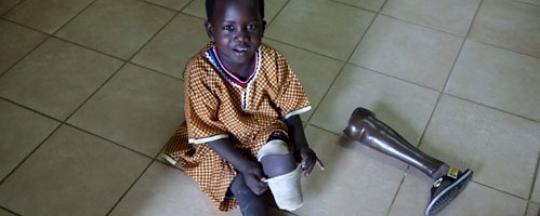The author, the Deputy Information and Communications Manager for Save the Children in South Sudan, says children need to be educated about Land Mines and Unexploded Ordances.
On the 4th of April, the world marked the ‘International Day for Mines Awareness and Assistance in Mines Action’ around the world. In South Sudan, it was a day to remember and stand in solidarity and sympathy with those who have fallen victim to Land Mines and Unexploded Ordnance (UXOs). There are thousands of South Sudanese whose lives have been devastated by Land Mines and UXOs.
Memories of a family which fell victim to UXOs in Akobo came flooding back to my mind on 4th April. Although this family was lucky to survive, it is now a daily struggle to merely survive. Nyawan, the bread winner of the family, can no longer work and provide food for her children after the injury she sustained. They now depend on relief food, and even then, it’s not always guaranteed that they will get it.
Tragedy struck the family while they were returning from a nearby market. Out of nowhere a UXO exploded, injuring the mother on the left arm and leg, while Joseph*, her 8 year old son’s leg was amputated. At the time of her injury, Nyawan was pregnant with her youngest daughter. It seems the impact of the blast and her injuries affected the baby in the womb, and her daughter was born paralyzed. Nyawan’s little daughter is two years old now, but she can neither sit, nor talk.
With sadness written all over her face, Nyawan sat behind her grass thatched tukul (hut) in the middle of Neem trees. She held her two year old daughter in her arms, while her son Joseph* sat to her left. For her, the hope of a better life is over – all thanks to the devastating impact of UXOs. She can’t work anymore to provide for her children, and sadly, her husband died sometime back.
“When the incident happened, I felt bad because my only son was also injured, and his father had died. I thought he would be the one to help me in the future, but there is little chance of that happening now.” Nyawan said, adding that, “…I wanted to go to a refugee camp because I have no energy to work. My hand is paralyzed; I cannot even raise money to buy exercise books and pens for Joseph. For now, I can’t move out of the house because I have to be with my child all the time” Nyawan said.
Thanks to the ‘Children of Peace’ education programme implemented by Save the Children with funding from the European Humanitarian Aid and Civil Protection (ECHO), Nyawan’s son *Joseph has got a second chance to get quality basic education – be it under very difficult conflict circumstances.
In his message on the ‘International Day for Mines Awareness and Assistance in Mines Action’, UN Secretary General Ban Ki Moon said, “…the United Nations is working to alleviate the suffering of affected communities in high-risk environments.”
In South Sudan, more than half a million people have received risk reduction education over the last 12 months, 14 million square metres of land contaminated by UXOs has been cleared, 3,000 kilometres of road made safe, and 30,000 UXOs left behind during the long war have been destroyed. This has enabled the delivery of food, water and the safe movement of those fleeing fighting. But a lot more needs to be done to make children aware of the dangers of UXOs – the ‘invisible killers’.
The end to the 21 year conflict between Sudan and South Sudan gave people hope that UXOs would finally be eliminated. De-miners, including women, put their lives on the line every day to make South Sudan a safe environment for its innocent children. Unfortunately, the outbreak of fresh violence in December 2013 reversed some of the gains that had been achieved by De-miners.
As for Nyawan, her only hope is that “South Sudan should have lasting peace to pave way for clearance of all land mines and the UXOs” so that innocent conflict victims like her can be supported.
*The name of Nyawan’s son has been changed to protect his identity
The views expressed in ‘opinion’ articles published by Radio Tamazuj are solely those of the writer. The veracity of any claims made are the responsibility of the author, not Radio Tamazuj.
File photo (above): A six-year-old amputee at the Juba Physical Rehabilitation Reference Centre. He was injured while traveling in a truck that hit a landmine (ICRC/T. Stoddart) ; (below) Nyawan and her son




